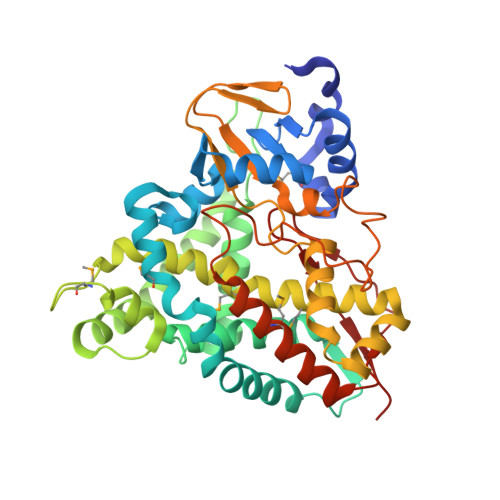A promiscuous cytochrome P450 aromatic O-demethylase for lignin bioconversion.
Mallinson, S.J.B., Machovina, M.M., Silveira, R.L., Garcia-Borras, M., Gallup, N., Johnson, C.W., Allen, M.D., Skaf, M.S., Crowley, M.F., Neidle, E.L., Houk, K.N., Beckham, G.T., DuBois, J.L., McGeehan, J.E.(2018) Nat Commun 9: 2487-2487
- PubMed: 29950589
- DOI: https://doi.org/10.1038/s41467-018-04878-2
- Primary Citation of Related Structures:
5NCB, 5OGX, 5OMR, 5OMS, 5OMU - PubMed Abstract:
Microbial aromatic catabolism offers a promising approach to convert lignin, a vast source of renewable carbon, into useful products. Aryl-O-demethylation is an essential biochemical reaction to ultimately catabolize coniferyl and sinapyl lignin-derived aromatic compounds, and is often a key bottleneck for both native and engineered bioconversion pathways. Here, we report the comprehensive characterization of a promiscuous P450 aryl-O-demethylase, consisting of a cytochrome P450 protein from the family CYP255A (GcoA) and a three-domain reductase (GcoB) that together represent a new two-component P450 class. Though originally described as converting guaiacol to catechol, we show that this system efficiently demethylates both guaiacol and an unexpectedly wide variety of lignin-relevant monomers. Structural, biochemical, and computational studies of this novel two-component system elucidate the mechanism of its broad substrate specificity, presenting it as a new tool for a critical step in biological lignin conversion.
Organizational Affiliation:
Molecular Biophysics, School of Biological Sciences, Institute of Biological and Biomedical Sciences, University of Portsmouth, Portsmouth, PO1 2DY, UK.

















